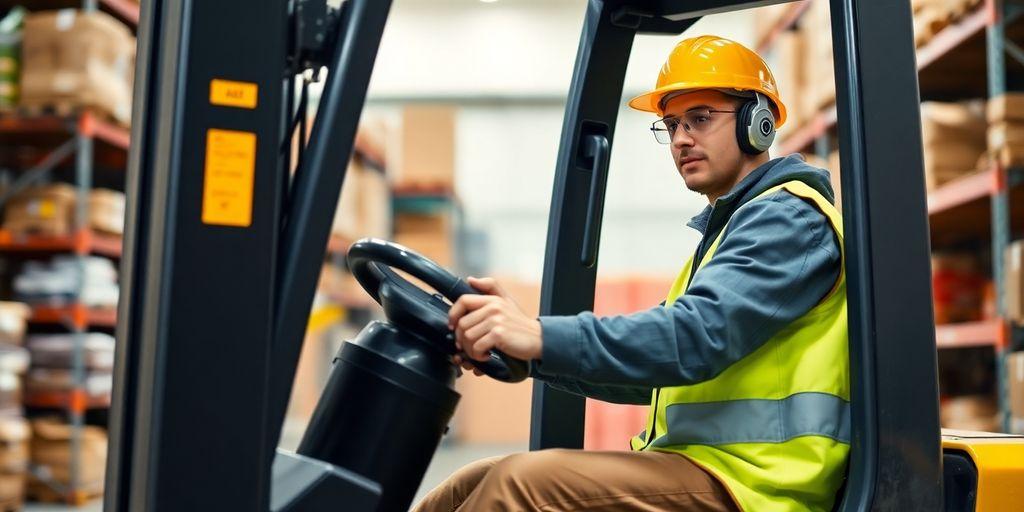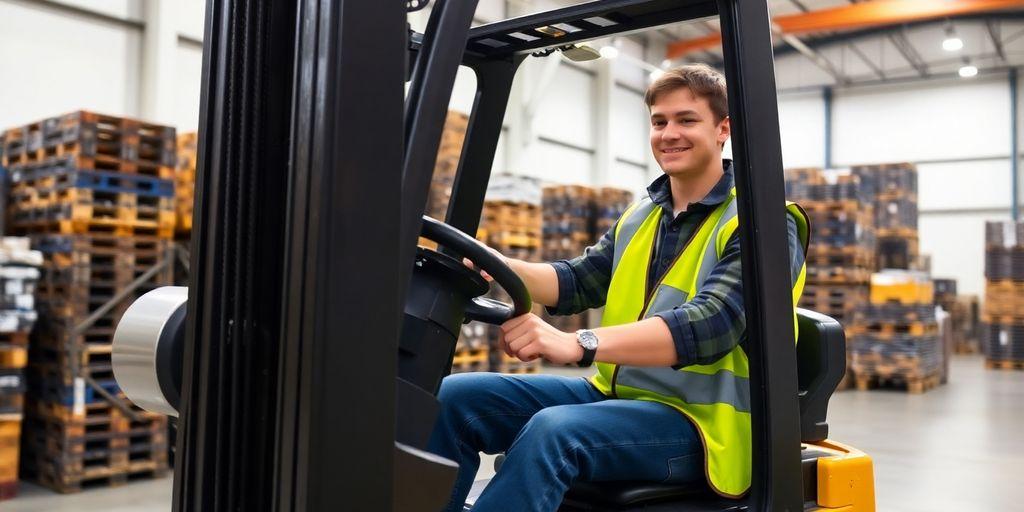
Ever wondered how old you need to be to drive a forklift? It’s not just about hopping on and going. There are rules to follow, mainly to keep everyone safe. Generally, you need to be 18 to operate one, but there are some exceptions, especially in agriculture. If you’re looking to get certified, Forklift Academy offers some great options that comply with OSHA standards.

In the United States, the age requirement to operate a forklift is primarily governed by federal laws, specifically the Fair Labor Standards Act (FLSA). The FLSA mandates that individuals must be at least 18 years old to engage in what it classifies as hazardous work, which includes operating forklifts. This regulation is crucial to ensure the safety of young workers and to minimize workplace accidents. However, there are exceptions in certain industries, such as agriculture, where younger individuals might be allowed to operate forklifts under specific conditions.
While federal law sets the baseline, individual states can impose additional requirements or exceptions. For instance, some states might allow individuals as young as 16 to operate a forklift in agricultural settings, provided they have completed the necessary training and are under supervision. It’s essential for employers to be aware of both federal and state laws to ensure compliance and avoid legal issues.
Agriculture often has its own set of rules when it comes to labor laws. In this sector, the age requirement can be lower, allowing 16-year-olds to operate forklifts. This exemption recognizes the unique nature of agricultural work and the reliance on younger workers in family-run farms. However, even with this exemption, safety training is non-negotiable. Employers must ensure that young operators are adequately trained and supervised to maintain safety standards.

Operating a forklift is no small task, and the Occupational Safety and Health Administration (OSHA) has set clear standards to make sure it’s done safely. OSHA mandates that forklift operators must be at least 18 years old in non-agricultural settings. This rule is part of a broader effort to minimize workplace accidents and ensure that operators have the maturity needed for such a responsibility. In agricultural settings, however, exceptions allow those as young as 16 to operate forklifts under strict conditions. Employers must adhere to these standards to avoid penalties and maintain a safe working environment.
Training is a cornerstone of OSHA’s regulations for forklift operators. Before anyone gets behind the wheel, they must undergo comprehensive training that covers everything from basic operation to recognizing potential hazards. This training is not a one-time event; operators must demonstrate their skills and understanding through evaluations. Certification by the employer is required, and this ensures that operators are competent and prepared to handle the equipment safely. Regular refresher courses are also necessary to keep skills sharp and up-to-date.
Employers play a crucial role in maintaining safety standards. They are responsible for ensuring that all forklift operators are properly trained and certified. This includes providing ongoing education and making sure that the workplace complies with OSHA regulations. Regular safety inspections are essential, and any violations can lead to significant fines. Employers must also ensure that the working environment is free from hazards, following OSHA’s general safety guidelines, which include fall hazard regulations and other critical safety measures. By fulfilling these responsibilities, employers help create a safer, more efficient workplace.

If you’re thinking about operating a forklift, getting certified is your first big step. Certification isn’t just a piece of paper; it’s proof that you know how to handle these powerful machines safely. Without proper certification, you’re not only risking your safety but also that of your coworkers. Certification ensures you understand the ins and outs of forklift operation, from maneuvering to load management.
A solid training program covers both theory and practice. You’ll start with classroom lessons to learn about equipment controls, safety protocols, and load handling. Then, you get to the fun part—hands-on training where you actually operate the forklift under supervision. Here’s what a typical program might include:
For those looking to master forklift operation, picking the right program is crucial. Online courses are available, but in-person training offers the advantage of direct supervision.
Even after getting certified, the learning doesn’t stop. OSHA requires operators to be evaluated at least once every three years. If you switch to a different type of forklift or if your job site changes, additional training might be necessary. Refresher courses help you stay updated on the latest safety protocols and ensure your skills remain sharp. Providers offer convenient options for keeping your certification current, ensuring you meet all the necessary OSHA requirements.

Operating a forklift is no small task, especially for younger operators who might be new to the workforce. It’s crucial that they demonstrate both competence and maturity before getting behind the controls. This means not only understanding how the machine works but also recognizing the importance of safety protocols. Young operators need to be aware of their surroundings and the potential hazards that come with operating heavy machinery. Employers should assess each individual’s readiness, perhaps through a practical test or a probationary period, to ensure they’re truly prepared.
When it comes to forklifts, safety protocols are non-negotiable. Young operators should be thoroughly trained in the following practices:
Additionally, daily safety checks are a must. Inspect brakes, lights, and fluid levels before starting the shift. Wearing appropriate personal protective equipment (PPE), like hard hats and safety shoes, further enhances safety on-site. For more essential forklift safety tips, these measures are critical in keeping everyone safe.
Age can influence how an operator handles a forklift. Younger individuals might have quicker reflexes, but they might also lack the experience to foresee potential issues. It’s a balancing act between youthful energy and seasoned caution. Employers should consider pairing young operators with mentors or more experienced colleagues who can provide guidance and support. This mentorship can help bridge the gap between enthusiasm and expertise, leading to safer operations overall. For those working in non-traditional environments, understanding the unique challenges and adapting safety measures accordingly is vital.
In wrapping up, understanding the age requirements and necessary certifications for operating a forklift is crucial for both safety and legal compliance. Generally, you need to be at least 18 years old to operate a forklift in non-agricultural settings, with some exceptions for agricultural work. Proper training and certification, as mandated by OSHA, are essential to ensure safe operation and to minimize workplace accidents. For those looking to get certified, Forklift Academy offers comprehensive training solutions that meet OSHA standards, making it easier for individuals and businesses to comply with regulations. Whether you’re new to forklift operations or seeking to update your skills, investing in the right training is a step towards a safer workplace.
In most places in the U.S., you need to be at least 18 years old to drive a forklift. However, some agricultural jobs might allow younger operators with proper training.
Yes, you must complete safety training and get certified by your employer to operate a forklift safely.
OSHA requires operators to be trained and evaluated to ensure they can operate forklifts safely. This helps prevent accidents and keeps the workplace safe.